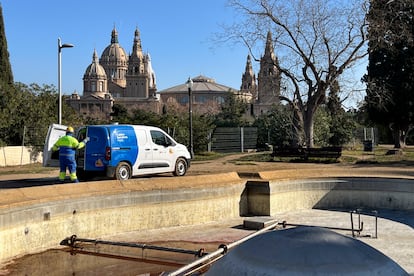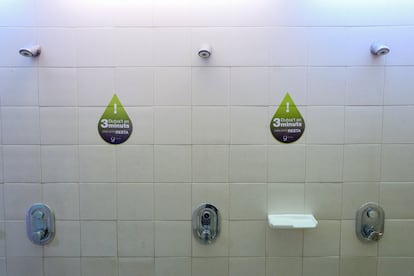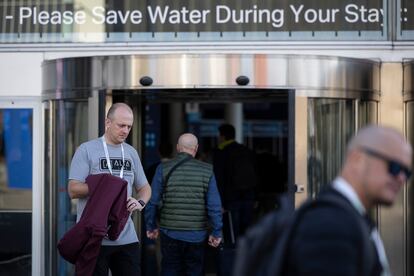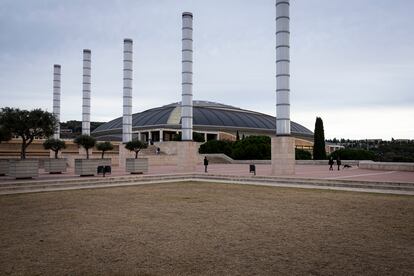Barcelona combats drought by reducing tourist consumption and preserving trees
The government of Catalonia, Spain, has announced an extreme drought emergency with restrictions that will affect six million citizens. In Barcelona, signs have gone up warning visitors to use water responsibly and hotels are studying filling pools with saltwater

The government of Catalonia, Spain, has announced an extreme drought emergency with measures and restrictions that will affect six million citizens in 202 municipalities, including Barcelona. The city of Barcelona has been preparing for this new phase of extended drought for months. The Barcelona City Council led by Mayor Jaume Collboni acknowledges that some of the city’s trees may not survive, but they are taking measures to minimize this by optimizing the use of groundwater wells. The Council previously announced that street-cleaning trucks will be used to water trees in the city.
The City Council held a meeting in mid-December with hoteliers and tourist industry representatives to discuss ways to reduce potable water consumption in Barcelona. Their objective is to reduce consumption to 53 gallons (200 liters) per person per day starting on February 1. Barcelona residents already consume less than that (163 liters per day), demonstrating their commitment to weathering the drought. However, high water consumption in hotels remains a concern. On average, five-star hotels use 144 gallons (545.5 liters) of water per tourist daily, while four-star hotels use 98 gallons (373 liters), three-star hotels use 61 gallons (232 liters), and two-star hotels use 44 gallons (165 liters). Swimming pool and jacuzzi facilities contribute significantly to this consumption.

Some members of the hotel association waited for the drought emergency to be officially declared, while others already took steps to reduce consumption. Catalonia’s General Directorate of Tourism also said the hotel industry is prepared to fill swimming pools with saltwater and adjust toilets to use less water with each flush. The Tourism Directorate has also launched a system of subsidies so that adapting tourist facilities to the drought doesn’t negatively affect the industry. Signs and posters are ready to be posted, and tourists will soon find reminders in their hotel rooms like, “Use a glass when you brush your teeth” and “Take a shower instead of a bath.”
The Barcelona airport has been running an unofficial campaign for months to raise awareness about water consumption. Signs about the drought have been placed around the airport and flight information screens promote responsible water use. Automatic faucets have been installed and drip irrigation has been reduced from 20 hours to eight. Lawn irrigation with sprinklers has completely eliminated. “We’re all about promoting responsible consumption,” said airport and tourism industry representatives, who also noted their use of non-potable water to clean pavements and buildings.
People attending the Integrated System Events (ISE) audiovisual industry conference in Barcelona (January 30-February 2) received information packets urging them to maximize every drop of water from Barcelona’s taps. At one venue entrance, an enormous LED screen displayed messages like “Support Catalonia, save water” and “Please save water during your stay.” Fira de Barcelona, one of the most important trade show organizations in Europe, cut off water sources outside the venue and checked every tap for leaks. ISE expects to exceed the 58,107 conference participants that attended last year, which may lead to high water consumption in the days leading up to the drought emergency declaration.

Barcelona will host the Mobile World Congress (MWC) at the end of February. The organizers expect around 95,000 attendees and have planned an awareness campaign about Catalonia’s three-year drought during the event. “I’m from Sweden, where we have much more water than we need. A lot of people who aren’t from around here might not realize we’re in the middle of a drought,” said Mats Granryd of GSMA, the mobile industry association sponsoring the event.
Preserving urban vegetation
To preserve Barcelona’s 35,000 trees, the City Council is taking measures to prevent them from dying of thirst. Irrigation is being cut back, and groundwater is slowly replacing potable water. Lawns in areas without groundwater pipelines are no longer being watered. During the drought emergency, all lawn irrigation will be halted, and minimal amounts of groundwater will be used exclusively for watering trees and preserving historic gardens.

The Barcelona Zoo is one of the city’s facilities that consumes the most water. A designated “sensitive consumer,” the zoo needs large quantities of water for the animals. Even so, water pressure has been reduced, resulting in a 15% decrease in consumption. The City Council is currently training its staff to water trees using 28 repurposed street-cleaning tanker trucks filled with groundwater. According to official sources, there are currently no concerns about depleting the groundwater. They also assure that the streets will be as clean as always.
Sign up for our weekly newsletter to get more English-language news coverage from EL PAÍS USA Edition
Tu suscripción se está usando en otro dispositivo
¿Quieres añadir otro usuario a tu suscripción?
Si continúas leyendo en este dispositivo, no se podrá leer en el otro.
FlechaTu suscripción se está usando en otro dispositivo y solo puedes acceder a EL PAÍS desde un dispositivo a la vez.
Si quieres compartir tu cuenta, cambia tu suscripción a la modalidad Premium, así podrás añadir otro usuario. Cada uno accederá con su propia cuenta de email, lo que os permitirá personalizar vuestra experiencia en EL PAÍS.
¿Tienes una suscripción de empresa? Accede aquí para contratar más cuentas.
En el caso de no saber quién está usando tu cuenta, te recomendamos cambiar tu contraseña aquí.
Si decides continuar compartiendo tu cuenta, este mensaje se mostrará en tu dispositivo y en el de la otra persona que está usando tu cuenta de forma indefinida, afectando a tu experiencia de lectura. Puedes consultar aquí los términos y condiciones de la suscripción digital.








































